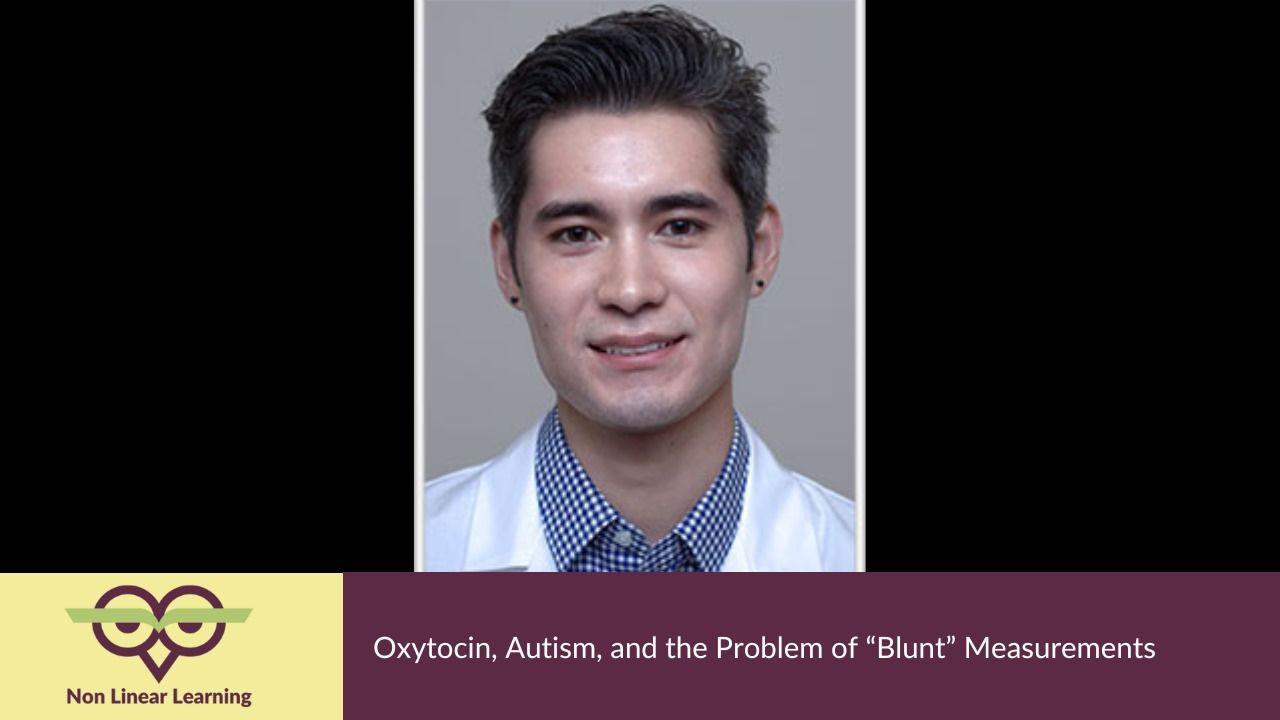196 Oxytocin, Autism, and the Problem of “Blunt” Measurements
Nov 07, 2025
In this episode, psychiatrist and researcher Dr. Eric Strobl joins Dr. Vaish Sarathy to talk about a new re-analysis of the SOARS-B trial on oxytocin and autism.
While earlier studies found no clear benefit, Dr. Strobl’s fine-grained, item-level analysis using machine learning uncovered consistent evidence that oxytocin can enhance social-emotional reciprocity the ability to engage, connect, and respond in social contexts.
Together, they discuss:
-
Why most autism drug trials fail to show benefit
-
What “blunt outcome measures” really mean in clinical research
-
How machine learning can extract signal from noise in complex data
-
What oxytocin actually does (and doesn’t do) in real life
-
How future studies could use more nuanced, individualized measures
Resources and Links Mentioned
-
Study Discussed:Strobl E et al. (2024). “Item-Level Analysis Reveals Oxytocin Improves Social-Emotional Reciprocity in Autism Spectrum Disorder.” Preprint
-
Parker KJ et al. (2017). “A Randomized Clinical Trial of Oxytocin in Children and Adolescents with Autism Spectrum Disorder.” Journal of the American Medical Association (JAMA Psychiatry) Link
-
Related Reading:
-
On machine learning in psychiatry: Nature – Machine learning in mental health research
-
Oxytocin may help but not for everyone. Its most reliable effect seems to be reducing social anxiety and improving comfort in social exchanges.
-
Measurement matters. “Blunt” outcome scales can bury meaningful results under noise. Item-level, data-driven analysis reveals nuance traditional methods miss.
-
Autism heterogeneity is real. The same outward behavior can stem from different root causes - so future trials need precision tools, not averages.
-
Hope through better science. New methods aren’t about hype—they’re about accuracy, compassion, and smarter research design.
About Dr. Eric Strobl
Dr. Strobl is a psychiatrist and data scientist at the University of Pittsburgh who develops innovative machine-learning algorithms to uncover hidden structure in medical data. His current work focuses on autism, neurodevelopmental conditions, and the use of AI to improve clinical trial design.
About Dr. Vaish Sarathy
Dr. Vaish Sarathy is a TEDx speaker, PhD chemist, educator, and mom to a non-speaking autistic teen poet with Down syndrome. She hosts the Non Linear Learning podcast and leads the Non Linear Education course for parents and educators who believe that every brain can learn, given the right way to teach.
Stay Connected
-
Instagram: @drvaishsarathy
-
Free Guide: Turn ON Your Child’s Learning Switch
-
Join the Non Linear Education Waitlist: Get on the list here →
Listen On
 |
 |
Disclaimer: The information in this Podcast is for educational purposes only. Vaishnavi Sarathy, Ph.D. is an educator, not a doctor, specifically not your child’s doctor. Please consult your physician before implementing any supplement or diet recommendations.
Join the most determined disability community that is:
- ABANDONING THE IDEA OF LEARNING AND INTELLECTUAL DELAY.
- ready for their kids to receive AN EQUAL EDUCATION
- ready to be in the ZONE!
Enter your email address below to sign up for my newsletter, and in just 5 mins every week, get ready to transform your understand of learning and gut health, regulation and focus, stability and education!
Your information is protected and I never spam, ever. You can view my privacy policy Here.



